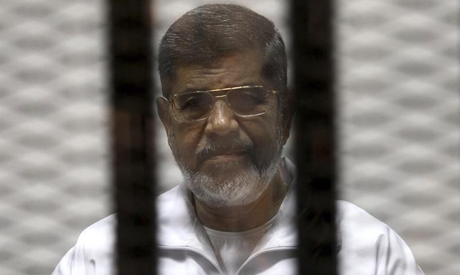Egypt court issues preliminary death sentence to Morsi in ‘jailbreak case’
The court has sent its decision in the Natroun case to the country’s grand mufti, a senior Muslim cleric, for a consultative review as required by Egyptian law, setting 2 June as a date for a final verdict.
The court also issued a preliminary death sentence to Brotherhood leaders Mohamed El-Beltagy and Khairat El-Shater along with 14 others in the trial known as the “Hamas espionage case.”
The court also sent its decision in this case to the grand mufti for a consultative review. The deadline for a final verdict is also 2 June.
In the Natroun jailbreak case, the prosecution charged Morsi and co-defendants with damaging and setting fire to prison buildings, murder, attempted murder, looting prison weapons depots and releasing prisoners.
The prisoners, who broke out of jail in 2011, include members of the Palestinian Hamas movement, Lebanon’s Hezbullah, jihadists, Muslim Brotherhood members and varied criminals, according to the prosecution.
Prosecutors also said that over 800 fighters from Gaza had infiltrated Egypt, using RPGs and heavy armaments to storm three prisons, abducting four policemen and killing several others, along with inmates.
In the espionage case, prosecutors had charged Morsi and 35 others with conspiring with foreign powers — including the Palestinian Islamist group Hamas, Lebanon’s Hezbullah and Iran’s Revolutionary Guard — to destabilise Egypt.
The court did not on Saturday issue a ruling against Morsi and 18 others in the case and scheduled the announcement for 2 June, suggesting that the former president, unlike those sentenced to death in the case today, will not receive a death sentence in this case.
Mufti to consider death verdicts
Although the grand mufti’s opinion is non-binding on the court, Egyptian judges have traditionally adjusted their final rulings in accordance with the mufti’s recommendations.
In March 2014, a Minya court issued preliminary death sentences against 529 Morsi supporters who were accused of murder and attempted murder, referring the verdict to the mufti for consultation.
Following the mufti’s refusal to approve the sentences, the court issued a final verdict sentencing only 37 defendants to death and 492 to life in prison.
In April 2014, the same court issued preliminary death sentences against 683 Morsi supporters who were accused of murder and attempted murder, referring the verdict to the mufti.
Once again, following the mufti’s objections, court issued a final ruling of capital punishment against only 183 of the defendants. The defendants retain the right to appeal any final verdict.
Both Minya verdicts were recently overturned by appeal courts which ordered a new trial.
First death sentence for an Egyptian president
Saturday’s capital punishment ruling against Morsi makes him the first president in Egypt’s history to face the possibility of death by hanging if the court ratifies its initial decision on 2 June or if he loses a planned appeal.
Morsi has been charged with a number of offences since his ouster in 2013, and has received a number of sentences.
In April he was sentenced to 20 years in prison for inciting violence and ordering the arrest and torture of demonstrators during the December 2012 clashes between his supporters and opponents.
Other leading Brotherhood figures sentenced to death on Saturday in the espionage case include Mahmoud Ezzat, who is not in custody. Ezzat has been acting Brotherhood leader since August 2013, following the arrest of Supreme Guide Mohamed Badie.
Other Brotherhood leaders sentenced to death in the jailbreak case include Islamist preacher Youssef El-Qaradawi, who resides in Qatar; Supreme Guide Mohamed Badie; former speaker of the house Saad El-Katatni; and vice president of the Brotherhood’s Freedom and Justice Party Essam El-Erian.
In April also, Brotherhood supreme guide Mohamed Badie, Omar Malek, the son of leading Brotherhood member and businessman Hassan Malek, as well as leading member Saad El-Husseiny were among fourteen Islamists who received the capital punishment in a separate murder trial. The verdict in this case has been appealed.
Hundreds of members of the Brotherhood, which was banned a few months after Morsi’s ouster, face trials on various criminal charges including murder, attempted murder, inciting violence and breaking the protest law.
Critics respond
Leading Muslim Brotherhood member and a former minister under Morsi, Amr Darrag, quickly condemned the verdict and called on the international community to take action.
“This is a political verdict and represents a murder crime that is about to be committed, and it should be stopped by the international community,” Darrag, co-founder of the dissolved Freedom and Justice Party, the political wing of the Muslim Brotherhood, told Reuters in Istanbul.
The National Alliance to Support Legitimacy, a pro-Morsi coalition, issued a statement following the verdict saying that they “reject the principle of prosecuting the country’s elected president Mohamed Morsi.”
The statement added that the charge of espionage should be directed instead at the “leaders of the military coup”, who it claimed “jeopardised Egypt’s security in favour of Israel.”
Hamas spokesman Sami Abu-Zuhri said in a statement that the verdict was based on “false information”, adding that some of the convicted had died before the Egyptian revolution such as “martyrs Tayseer Abu-Senema and Hossam El-Sanea,” while others have been in the “prisons of the occupation for years,” such as Hassan Salama, who has been imprisoned for 19 years in Israel.
Turkish President Recep Tayyip Erdogan also condemned the death sentence handed out to Morsi, saying it was like a return to “ancient Egypt”, AFP reported.
“The popularly-elected president of Egypt… has unfortunately been sentenced to death. Egypt is turning back into ancient Egypt,” Erdogan said at a rally in Istanbul, accusing the West of “turning a blind eye” to what he described as the 2013 coup that ousted Morsi.
Source:Alahram

